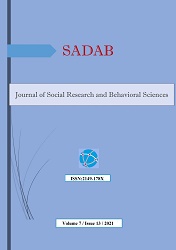Covid-19 Sürecinde Akademisyenlerin Acil Uzaktan Eğitim Sistemi Kullanım Algılarının Planlı Davranış Teorisi Temelinde Teknoloji Kabul Modeli ile İncelenmesi
An Analysis of Academics’ User Perceptions of Emergency Distance Education Systems within COVID-19 based on the Theory of Planned Behavior Using Technology Acceptance Model
Author(s): Fevziye Bekar, Handan ÇamSubject(s): Higher Education , Behaviorism, Health and medicine and law, Distance learning / e-learning
Published by: SD Yayınevi
Keywords: New Coronavirus Pandemic; Technology Acceptance Model; Theory of Planned Behaviour; Emergency Distance Education System; Academics;
Summary/Abstract: Face-to-face education gave way to online emergency education due to the new Coronavirus pandemic. Regarding this change, this study aims to determine how academics perceive emergency distance education systems and the factors that affect their perceptions. Technology Acceptance Model was used for the theory of planned behaviour in this study. The population consisted of academics. Convenience and snowball sampling methods were used to reach the 444 academics that work in 43 different universities. The data were collected with online questionnaire forms through Google Forms. The collected data were tested through reliability, validity and confirmatory factor analyses and the research model was reviewed through the structural equation model. As a result, seven out of the nine suggested hypotheses were accepted. The research concluded that the subjective norm variables based on the theory of planned behaviour such as interpersonal effects and external effects did not have an impact on behavioural intention; perceived usefulness and perceived ease of use had a significantly positive effect on satisfaction towards the use of distant education; satisfaction and perceived behavioural control had a significantly positive effect on behaviour and that behavioural intention had a significantly positive effect on behaviour towards the use of distant education.
Journal: Sosyal Araştırmalar ve Davranış Bilimleri
- Issue Year: 7/2021
- Issue No: 14
- Page Range: 115-136
- Page Count: 22
- Language: Turkish

